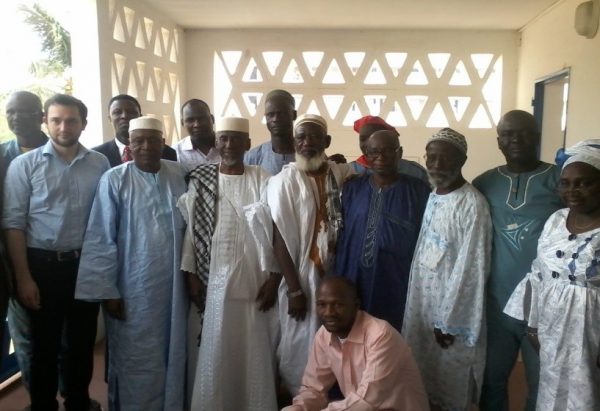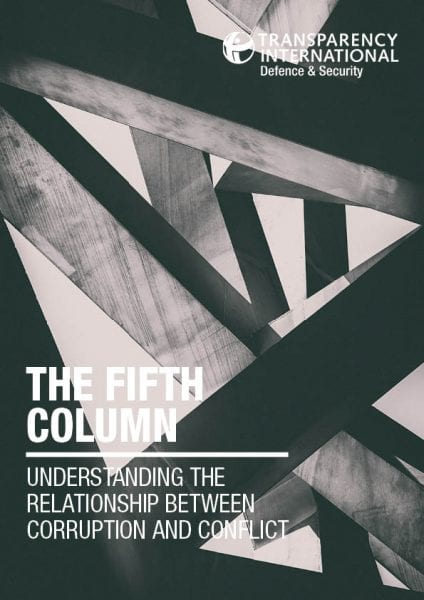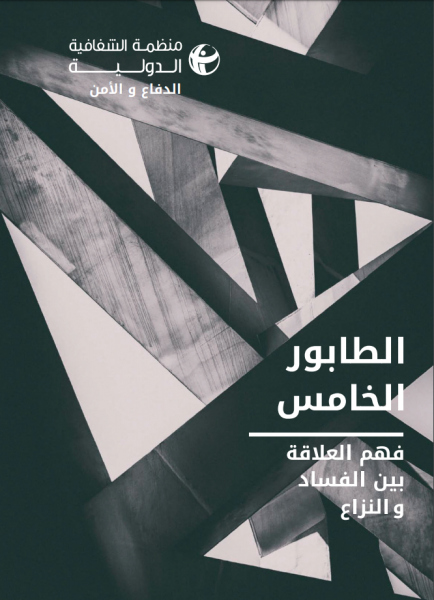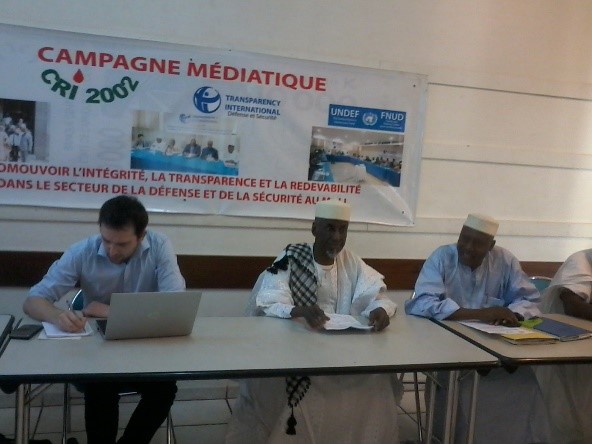Show Index: gdi
Ghana is often seen as the good governance frontrunner in West Africa. The country is also a strong contributor to international peacekeeping missions, particularly in sub-Saharan Africa, and the Accra-based Ghana Armed Forces Staff and Command College (GAFCSC) and Kofi Annan International Peacekeeping Training College (KAIPTC) are respected training hubs hosting military personnel from across the region.
However, the Government Defence Integrity Index (GDI) 2020 for Ghana highlighted key areas of continued corruption risk within the defence sector, including a lack of transparency in procurement, limited oversight over key defence issues, and limited acknowledgement of corruption as a strategic issue on military operations.
Our project, which began in March 2019 and is funded by the UK Department for International Development, aims to work with national Ghanaian defence institutions, civil society and media organisations, and parliamentarians to strengthen their anti-corruption expertise and their capacity to implement effective change. Key project activities include conducting Leadership Days for senior defence officials to introduce them to corruption risks and best practice; supporting national civil society and media in engaging in coordinated advocacy activities; conducting capacity-building workshops for parliamentarians responsible for defence oversight; and working with KAIPTC and GAFCSC to strengthen anti-corruption training for military personnel.
In strengthening the expertise and capacity of Ghanaian institutions, Transparency International – Defence & Security and the Ghana Integrity Initiative aim to support the country’s efforts in becoming a regional lead on defence anti-corruption issues and improving the integrity of their international peacebuilding activities.
Corruption is widely recognized as one of the fundamental drivers of conflict in Mali and a lack of accountability to the population from the defence and security apparatus has fed into the unrest. With the support of the UNDEF, and in partnership with Transparency International’s National Chapter in Mali CRI-2002, we are seeking to reduce the risk of corruption in the Malian defence sector, through strengthening civil society’s expertise on defence accountability and good governance and building its capacity to influence anti-corruption reforms in the sector.
In many countries, there is a critical disconnect and lack of communication and understanding between civil society and defence and security institutions which results in very limited interaction and engagement. This hinders the effectiveness and accountability of defence institutions and restricts civilian understanding and knowledge of the sector which can lead to a shortfall in trust between the two.
We have conducted detailed research into institutional safeguards in Malian defence institutions and held a series of regional focus group discussions to form a solid evidence base to help build the capability and coordination of civil society advocacy efforts for greater defence accountability. The creation of a national Civil Society Organisations (CSO) Forum specialised on defence and security issues, made up of 30 Malian CSOs with its own structure and strategy has helped to coordinate civil society efforts and establish a credible platform with which to engage with the defence sector. We have also worked to build relationships with key government agencies in Mali and organised leadership days, bringing together senior defence officials with civil society actors to bridge the gap between the two and foster consensus on necessary reforms. This approach has been complemented by an ongoing media campaign which is raising awareness as to the detrimental effects of defence sector corruption among the wider Malian population.
TI-DS in Mali
 |
 |
Corruption had an undeniable impact on Nigeria’s security situation. Corruption in the defence sector, in particular, has resulted in the waste of billions of dollars’ worth of public funds through corrupt defence procurement practices and the abuse of the opaque security funding system known as “security votes”. This public money could have been otherwise more productively directed towards countering security threats and building a modern and efficient defence force. Corruption within the Nigeria defence sector arguably inhibited the ability of Nigerian armed forces to effectively tackle the insurgent threat in the North East as well as respond to the oil bunkering in the Niger Delta, the conflict in the Middle Belt and the threat of maritime piracy in the Gulf of Guinea – reports of ghost soldiers, the skimming of soldiers’ salaries, and the procurement of faulty and outdated weaponry suggest misconduct within the armed forces that affected operational effectiveness.
In cooperation with our local chapter in Nigeria, the Civil Society Legislative Advocacy Centre (CISLAC), we are conducting a project aiming to Increase Transparency, Accountability and Integrity in the Nigerian Defence Sector (ITAI). ITAI’s objectives focus firstly on building a culture of integrity within Nigeria’s armed forces and civilian defence structures by working to develop an understanding of anti-corruption as crucial to achieving stability, and by supporting internal anti-corruption efforts.
Secondly, ITAI aims to strengthen civilian efforts to conduct effective oversight over the defence sector. We are therefore working with parliamentarians responsible for overseeing defence, civil society organisations and media representatives. Our aim is to not only strengthen these actors’ capacity and expertise on defence oversight but to also work with them to generate a strong and informed public discourse on defence corruption risks in Nigeria.
Our ITAI project builds on existing work conducted by Transparency International – Defence & Security and CISLAC in Nigeria through a previous project entitled Strengthening Accountability in the Nigerian Defence Sector (SANDS).
Lebanon has avoided the spill over from the conflict in Syria, but currently faces rising regional tensions which some fear could lead to conflict in Lebanon. At the same time, military expenditure has risen to 5% of the country’s share of GDP, and close to 14% of government spending; one of the highest shares of the government’s spending. While the Lebanese Armed Forces (LAF) benefit from support which generally transcends sectarian lines, the institution faces high risks of corruption due to limited parliamentary oversight and access to information, amplified by the lack of transparency to citizens and accountability beyond the armed forces. Strengthening the integrity of Lebanese defence institutions is crucial to guaranteeing an armed forces that can effectively respond to threats and is accountable to the Lebanese people.
Lebanon’s security situation remains fragile, and corruption a systemic weakness. The LAF have been keen to engage, and exhibit some regional best practices. Transparency International strives to capitalise on these best practices and the ongoing movement towards reform to encourage strengthening integrity within the armed forces.
We have therefore been working in partnership with the Lebanese Transparency Association (LTA), Transparency International’s chapter in Lebanon, since 2018. The primary aim of our Lebanon country programme is to promote transparency and the enhancement of integrity mechanisms within the Lebanese Armed Forces (LAF). Our approach is to collaborate, pursue dialogue, and engage with the LAF, as the Lebanese government seeks to demonstrate its broader commitment to reform and to countering corruption.
We are refining plans to achieve policy and institutional changes following the launch of the Government Defence Integrity Index (GDI), including strengthening anti-corruption reforms and promoting transparency and accountability within the LAF. Alongside this, we will collaborate to build the capacity of civil society to engage with the government, military and international community on defence corruption issues. We believe that raising stakeholder capacity is crucial to tangible progress within Lebanese defence institutions and, in turn, to strengthen the government’s ability to respond to its own national security threats.
Relevant publications
 |
 |
Military expenditure in Tunisia has increased to over 2% of the country’s GDP in recent years as counter-terrorism has become a government priority. The country has been under a state of emergency since 2015, due to continued conflict in neighbouring states and increased support for non-state armed actors and extremist groups. Despite this, Tunisia’s defence sector faces high corruption risks, largely due to its secretive nature and the difficulties for Tunisian citizens to access information on military spending and equipment. While the armed forces benefit from a high level of public trust and have made several commitments to strengthen integrity within the defence system, implementation of these commitments has, to date, been uneven. Moving forward on defence sector reforms would improve the military’s ability to respond to potential threats.
Strengthening governmental institutions, including through transparency and accountability to citizens, is also crucial in a nascent democracy such as Tunisia, to ensure that the government is capable of responding to the population’s needs. As part of this, Transparency International established a project in 2018 to advocate for the Ministry of Defence to strengthen access to information and accountability to Tunisian citizens.
We have been working in partnership with I WATCH, Transparency International’s chapter in Tunisia, since 2017. The primary aim of our Tunisia country programme is to promote improved transparency and encourage tangible reform within the Tunisian defence sector, by bolstering the capacity of civil society and supporting democratic civilian oversight of the sector. Transparency International – Defence & Security and I WATCH are keen to engage with the Ministry of Defence throughout the development of the Government Defence Integrity Index, all the while strengthening external oversight of the defence sector and raising civil society awareness of the importance of defence sector oversight.
In order to achieve these aims, we established an independent monitoring group comprised of Tunisian civil society and experts within the defence and security sectors in 2019 alongside I WATCH. The purpose of this group is to monitor the Tunisian defence sector’s progress in implementing reforms and improving transparency and accountability to Tunisian citizens. The group held its inaugural meeting in September 2019, where it identified its top priority issue areas to tackle in the coming year and developed an agenda for producing research and evidence-based advocacy.
The Niger Delta is the most important oil-producing region in Africa, with its oil providing 70 per cent of Nigeria’s government revenue. However, alongside the legitimate trade in the Delta’s oil products, there is a lucrative and organised illicit oil trade that reportedly loses Nigeria 200,000 barrels of oil every day. Participants in oil theft, also called “oil bunkering”, steal oil from pipelines, refine the oil, and then sell it to local, regional and international markets. It is a profitable criminal industry that cost the Nigerian government 3.8 trillion Nigerian naira (approx. USD$105 billion) in 2016 and 2017.
The illegal oil industry in the Niger Delta has received much international attention over the past few decades. Illegal activity has led to revenue losses as oil is siphoned off and stolen; the human cost and environmental pollution have similarly been significant. Regular spills of oil, arguably caused by oil theft and sabotage, have polluted the waterways, contaminated crops and other food sources, and released toxic chemicals into the air. In 2017, reports emerged that oil spills doubled the risk of child mortality in the Delta region.4 What remains under-explored, however, is the extent to which this illegal trade is enabled by one of Nigeria’s key state institutions: its armed forces.
This discussion paper presents preliminary findings based on interviews and focus group discussions conducted in the Niger Delta between February and July 2018. The goal is to understand how the situation evolved, to offer insight into our initial conclusions, to invite feedback and further consideration of the matter, and to provide guidance for further research.
Following several years of debate, Tunisia finally has strong legislation regarding access to information. The government adopted a law to this effect in 2016, praised by many as being one of the most progressive access to information laws in the world. However, the law has faced limitations to its application, which include overzealous application of national security related exceptions.
Transparency International Defence & Security and I WATCH (Transparency International’s national chapter in Tunisia) have conducted research to understand how the access to information law is being implemented in the defence sector. We have spoken with Members of Parliament, independent commissions and civil society organisations (CSO) in Tunisia, and conducted desk research. Additionally, I WATCH has filed several access to information requests to the MOD directly, to evaluate the nature of responses received. These activities have provided the findings, and formed the basis of our conclusions and recommendations, outlined below.
A translation of the report can also be read in Arabic here.
Ahead of the 2019 Presidential elections in Nigeria, Transparency International and the Civil Society Legislative Advocacy Center (CISLAC) are calling on candidates to commit to scrapping the unaccountable and secretive “security vote” spending – one of the most durable forms of corruption in Nigeria—saying that they fail to provide real security for citizens.
Read the full report below and download ‘Annex A: Federal Security Vote Data’ here and ‘Annex B: State Security Vote Data’ here.
The Tunisian anti-corruption landscape has developed significantly since 2011. Tunis has created anti-corruption institutions, issued stronger legislation on public access to information and protection of whistle-blowers, and proposed legislation on declaring assets and probing illicit enrichment. This marks positive progress that should be both applauded and capitalised upon.
Yet the defence sector – which generally enjoys strong public trust – has not received the same scrutiny. Research indicates that it is often exempted, on the basis of national security, from significant reform. Tunisian defence spending has been rising, with an increase in expenditure of almost 64% from 2011 to 2016. But transparency and integrity structures have not kept pace. This presents an urgent challenge. Secrecy and weak oversight are the breeding ground of corruption. And corruption undermines defence institutions, reducing their capability to respond to threats, and leads to wasteful spending. With a national emergency declared and rising defence spending, strengthening defence integrity and tackling weaknesses leading to corruption should be a priority for the Tunisian government.
Ahead of presidential elections in Egypt, our new report analyses the role and growing economic power of the military.
This report is currently unavailable to download. It will be re-uploaded as soon as possible.
Weaponising Transparency has found that unpublished defence budgets and arms procurements are still open to abuse by corrupt officials seeking to benefit from the conflict with Boko Haram and launder stolen money abroad. Many deaths in the conflict have occurred while the military lacks vital equipment, critical training, and morale.
Since 2011, 50,000 people have lost their lives in the conflict with Boko Haram, while millions have been displaced. An estimated US $15bn has been stolen from the defence sector and billions of Naira spent annually without clear rationale. While President Buhari has made significant moves to take on the secretive and powerful defence sector, the pace of reform in the MOD is too slow and lacks any strategy.
In this study Transparency International’s London-based Defence and Security Programme explores in some detail how security assistance programmes fared in an environment affected by corrupt practices and the nexus of corruption and criminality. The case study here is security assistance provided to the Malian Army by the U.S. and France in 2001-2012, i.e. prior to the coup in which units of the Malian Army deposed a sitting president. Our goal is to unpack the impact corrupt practices can have on the success of specific security assistance programmes and to start a conversation on how these risks can be addressed.


